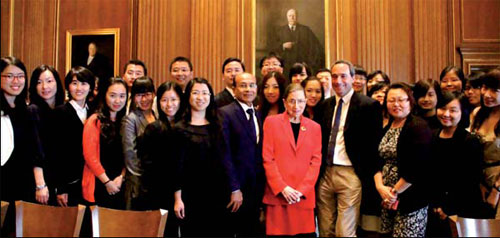Chinese judges get close-up view of US courts
Updated: 2012-07-20 11:33
By Cong Yan in New York (China Daily)
|
||||||||
|
Chinese jurists who participated in Columbia Law School's training program meet with US Supreme Court Justice Ruth Bader Ginsberg in Washington. Provided to China Daily |
For Qian Jiang, Hollywood myth tumbled headlong into the reality of a New York City courtroom.
"After seeing the real process of American dispute resolution, I found it was quite different from the movies," she said.
Jiang, an intellectualproperty judge in Beijing's Haidian district court, finished in late June a monthlong study program at Columbia Law School in New York with other visiting Chinese jurists. The 40-member group observed court proceedings, met American judges and took classes on the inner workings of the US legal system.
Most of the visitors were, like Jiang, in their 30s and hailed from 16 provinces of China, including remote cities such as Kunming and Nanning.
This was the fourth year Columbia hosted the program, which was co-arranged by the National Judges College of China's Supreme People's Court and City University of Hong Kong Law School. Participants are all working judges from the Chinese mainland who are pursuing master of law degrees from the Hong Kong university.
"One of the most interesting things to us is to see how the quality of the participants from China increases every year," said Columbia Law professor Benjamin Liebman, who has been teaching a course on torts for the program since it began in 2009.
This year the young judges took three customized courses - civil procedure, the US Constitution and tort law, taught by Columbia faculty. Each course lasted one week, followed by exams. They also had a private meeting in Washington with US Supreme Court Justice Ruth Bader Ginsberg, a 1959 graduate of Columbia Law.
The professors tried to instill in their visiting students an understanding of US jurisprudence while being mindful of how it differs from the Chinese system, Liebman said. They also had to consider differences between legal education in the two countries.
"One of the things we try to do during the classes is to introduce them to how we analyze the questions and let them see how American judges engage in legal reasoning and problem-solving," the professor explained.
Jiang found the civilprocedure course particularly interesting, saying it will help her "take parts of the [US] adversarial system into the traditional inquisitorial system of China in my daily work".
Liebman's familiarity with the Chinese legal system enabled him to focus on issues that are important to both China and the United States in his torts class. "Over the years, the classes have developed more discussion on differences between the two systems," he said.
Jiang found visits to New York municipal and state courts "impressive," and she welcomed the chance to see in person how American lawyers argue and how judges preside over a case. She and other students got to see life outside the classroom and the courtroom.
"This broadens my horizon and has changed my way of thinking in many aspects," the judge said.
China Daily

 Relief reaches isolated village
Relief reaches isolated village
 Rainfall poses new threats to quake-hit region
Rainfall poses new threats to quake-hit region
 Funerals begin for Boston bombing victims
Funerals begin for Boston bombing victims
 Quake takeaway from China's Air Force
Quake takeaway from China's Air Force
 Obama celebrates young inventors at science fair
Obama celebrates young inventors at science fair
 Earth Day marked around the world
Earth Day marked around the world
 Volunteer team helping students find sense of normalcy
Volunteer team helping students find sense of normalcy
 Ethnic groups quick to join rescue efforts
Ethnic groups quick to join rescue efforts
Most Viewed
Editor's Picks

|

|

|

|

|

|
Today's Top News
Health new priority for quake zone
Xi meets US top military officer
Japan's boats driven out of Diaoyu
China mulls online shopping legislation
Bird flu death toll rises to 22
Putin appoints new ambassador to China
Japanese ships blocked from Diaoyu Islands
Inspired by Guan, more Chinese pick up golf
US Weekly

|

|








